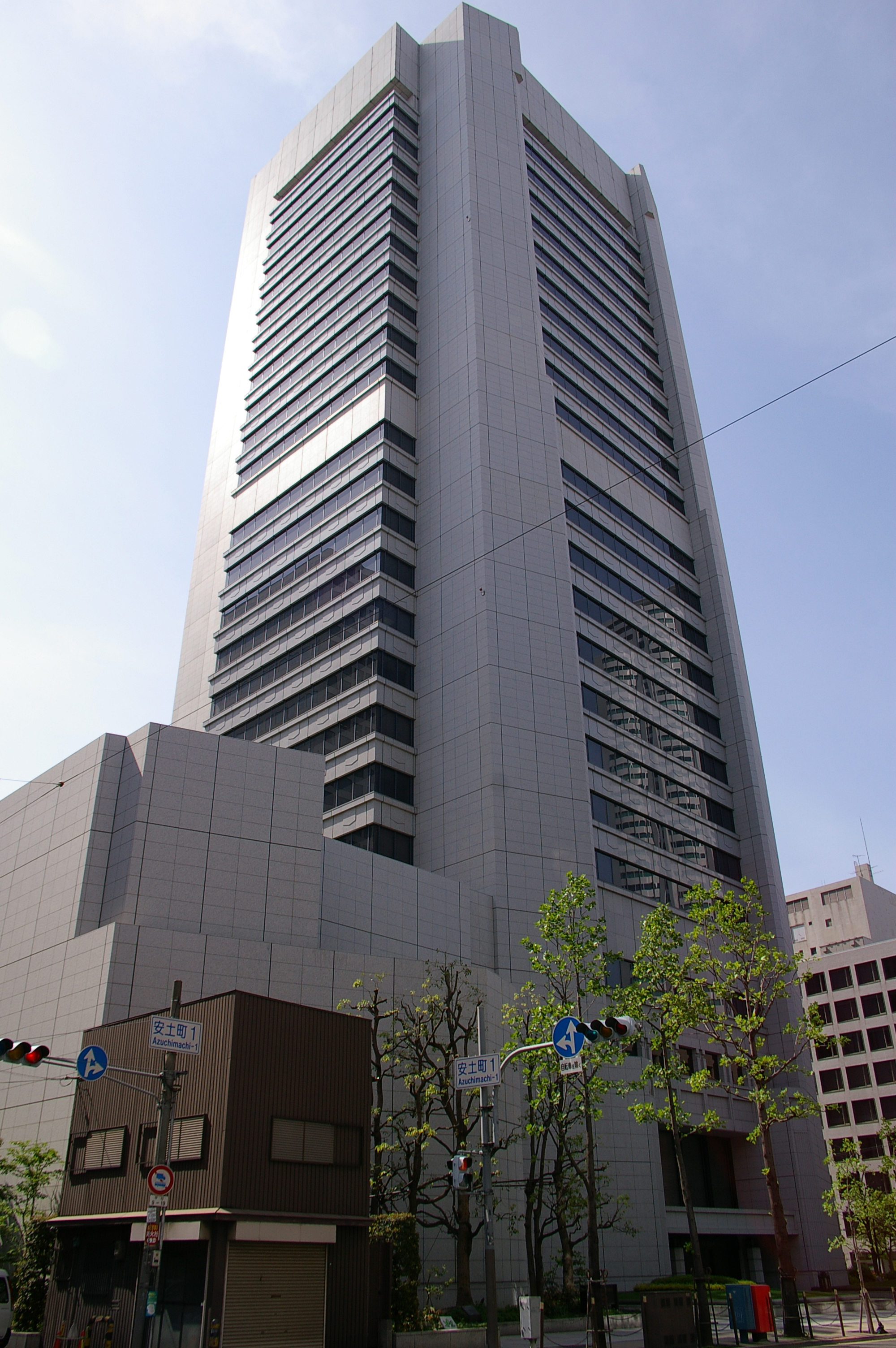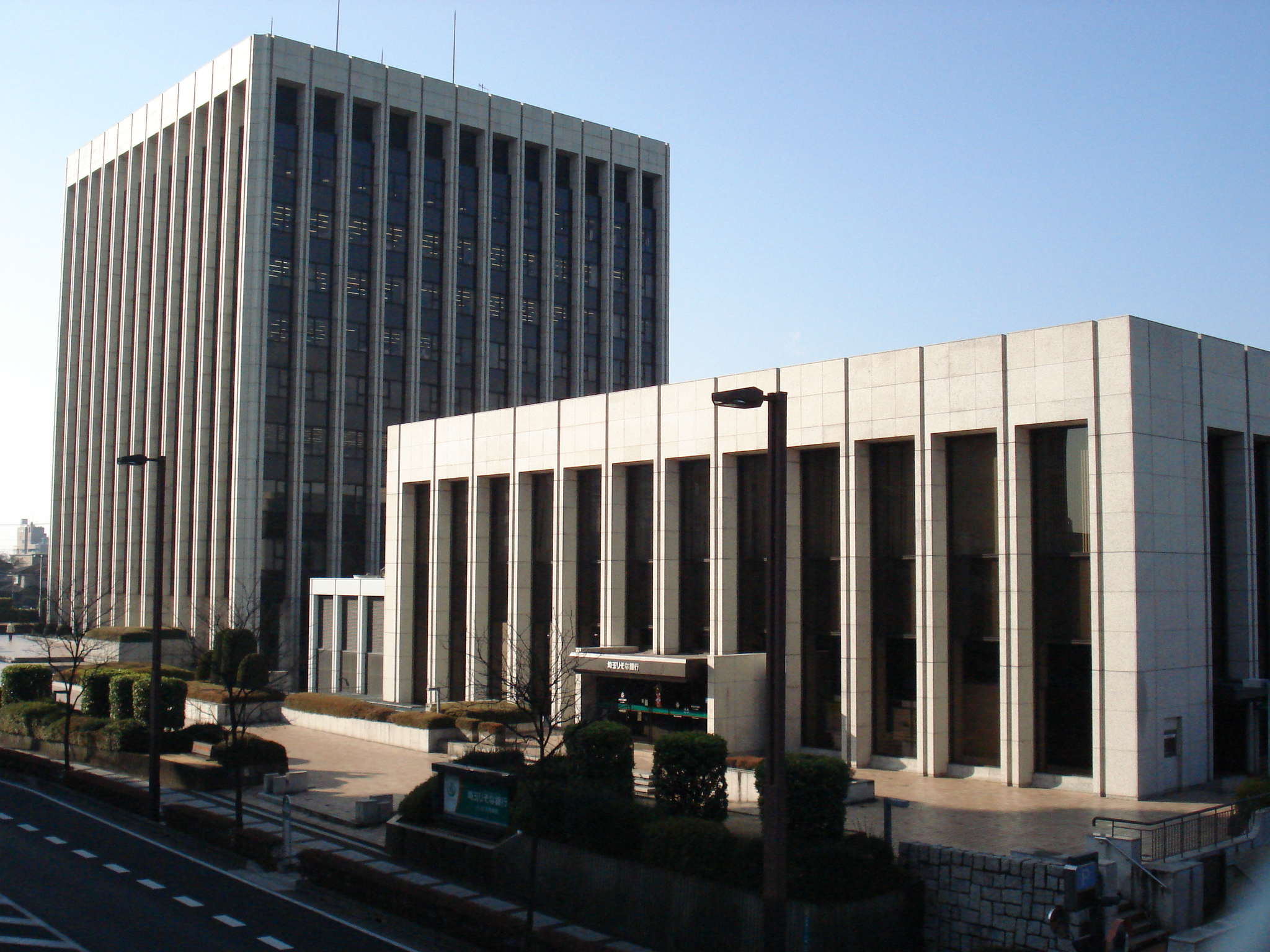Daiwa Bank on:
[Wikipedia]
[Google]
[Amazon]

 () is the
() is the
Major Group Companies
retrieved 2011-07-18 *The Kinki Osaka Bank, Limited *Resona Trust & Banking Company, Limited
Resona Holdings, Inc.
{{authority control Banks established in 1918 Banks of Japan Companies based in Osaka Prefecture Financial services companies based in Tokyo Holding companies based in Tokyo Companies listed on the Tokyo Stock Exchange Companies listed on the Osaka Exchange Companies formerly listed on the London Stock Exchange Government-owned companies of Japan Companies based in Saitama Prefecture

holding company
A holding company is a company whose primary business is holding a controlling interest in the securities of other companies. A holding company usually does not produce goods or services itself. Its purpose is to own shares of other companies ...
of , the fifth-largest banking group in Japan as of 2012. It is headquartered in the Kiba area of Koto, Tokyo. The main operating entities of the group are Resona Bank, a nationwide corporate and retail bank headquartered in Osaka
is a designated city in the Kansai region of Honshu in Japan. It is the capital of and most populous city in Osaka Prefecture, and the third most populous city in Japan, following Special wards of Tokyo and Yokohama. With a population of ...
, and Saitama Resona Bank, a smaller bank headquartered in Saitama City
is the capital and the most populous city of Saitama Prefecture, Japan. Its area incorporates the former cities of Urawa, Ōmiya, Yono and Iwatsuki. It is a city designated by government ordinance. Being in the Greater Tokyo Area and lyin ...
which primarily serves Saitama Prefecture. Most of these banks' operations are descended from Daiwa Bank and Asahi Bank, which merged in 2003.
History
Daiwa Bank
Resona was formed as the Osaka Nomura Bank in 1918. This entity served as the financing arm of the Nomura ''zaibatsu
is a Japanese term referring to industrial and financial vertically integrated business conglomerates in the Empire of Japan, whose influence and size allowed control over significant parts of the Japanese economy from the Meiji period unt ...
'' founded by Tokushichi Nomura
was a Japanese businessman and investor. He was the founder of the Nomura Group zaibatsu who formed Nomura Securities in 1925.The House of Nomura, ''Al Alletzhauser'', Bloomsbury Publishing Limited () In 1928, he was appointed to the House of P ...
. Its securities brokerage operation separated in 1926 to form Nomura Securities, now Japan's largest securities company. The bank was renamed Nomura Bank in 1927 and became the main bank for the Osaka Prefecture government in 1929, immediately following the 1929 stock market crash
The Wall Street Crash of 1929, also known as the Great Crash, was a major American stock market crash that occurred in the autumn of 1929. It started in September and ended late in October, when share prices on the New York Stock Exchange colla ...
.
The Nomura ''zaibatsu'' was dissolved in the wake of World War II, and the bank was renamed to The Daiwa Bank in 1948. It was one of the only major banks that offered both banking and trust services during the postwar era.
In 1995, a New York-based Daiwa bond trader, Toshihide Iguchi
(1951–2019) was an Executive VP and U.S. Government Bond trader at Daiwa Bank's New York Branch, who was responsible for $1.1 billion in unauthorized trading losses accumulated over a period of 12 years beginning in 1983.
Early life
Toshihide ...
, lost $1.1 billion speculating in the bond market and was charged with forgery and falsification of bank records. The bank was criminally indicted in November 1995 and ordered to leave the U.S. market; in the wake of this incident, there were talks of a merger between Daiwa and Sumitomo Bank
was a major Japanese bank based in Osaka and a central component of the Sumitomo Group. It merged with Sakura Bank on April 1, 2001 to form Sumitomo Mitsui Banking Corporation.
History
Sumitomo Bank was established as a private enterprise ...
, which would have created the world's largest bank at the time. Daiwa closed its United States operations in 1996, and eventually pulled out of overseas banking entirely in 1998.
Asahi Bank
was formed by a 9-bank merger in May 1945 to consolidate various savings banks that served Japanese individuals around the end of World War II. During the immediate postwar era, rapid inflation threatened the bank's business. In 1948, it was converted to an ordinary bank named . Kyowa merged with in 1991 to form , renamed in 1992. Asahi entered into merger talks withSanwa Bank
was a major Japanese bank headquartered in Osaka, which operated from 1933 to 2002. It merged with Tokai Bank to form UFJ Bank (now part of MUFG Bank). In the 1990s, it was the most profitable bank in the world, and second-largest in terms of ass ...
and Tokai Bank
Tōkai ( 東海, literally ''East Sea'') in Japanese may refer to:
* Tōkai region, a subregion of Chūbu
* Tōkai, Ibaraki, a village, also known as "Tokaimura" (Tokai-village)
* Tōkai, Aichi, a city
* Tōkai University, a private university in T ...
, and the three banks announced a merger in 2001. The merger would have created the third-largest bank in the world behind Deutsche Bank
Deutsche Bank AG (), sometimes referred to simply as Deutsche, is a German multinational investment bank and financial services company headquartered in Frankfurt, Germany, and dual-listed on the Frankfurt Stock Exchange and the New York Sto ...
and Mizuho Financial Group
, abbreviated as MHFG, or simply called Mizuho, is a banking holding company headquartered in the Ōtemachi district of Chiyoda, Tokyo, Japan. The name "" literally means "abundant rice" in Japanese and "harvest" in the figurative sense. Upo ...
. However, Asahi pulled out of these talks later that year. The eventual Sanwa-Tokai merger formed UFJ Bank UFJ, which stands for the United Financial of Japan, is used in the former companies of UFJ Bank, UFJ Group, and UFJ Holdings. These related institutions disappeared after the merger of The Bank of Tokyo-Mitsubishi and UFJ Bank in 2005. UFJ Bank ...
.
Resona merger
Daiwa formed abank holding company
A bank holding company is a company that controls one or more banks, but does not necessarily engage in banking itself. The compound bancorp (''banc''/''bank'' + '' corp ration') is often used to refer to these companies as well.
United States ...
, Daiwa Bank Holdings, in December 2001 to serve as the parent entity of Daiwa, Kinki Osaka Bank and Nara Bank. Later that month, Daiwa announced that Asahi Bank would be acquired by Daiwa Bank Holdings in a share swap transaction, forming the fifth-largest banking group in Japan. The company was renamed Resona Holdings, Inc. on 1 October 2002.
Daiwa and Asahi consolidated operations on 1 March 2003, with most of their assets combined to form Resona Bank. 100 Asahi Bank branches in Saitama and three branches in Tokyo were moved to a separate entity, Saitama Resona Bank.
Post-merger developments
In early 2003 the Resona Group's capital adequacy ratio fell dangerously low. The bank had proposed to maintain its capital adequacy ratio above the legal limit by factoring in deferred tax assets. However, the value of these deferred assets could only be claimed if the company turned a profit in the future. Because the bank's profit outlook was so dim, Resona's auditor refused to certify the company's financial statement if the deferred tax assets were included. Without being able to count the deferred tax assets, the bank was effectively insolvent. The Resona case threatened to cripple the entire country's financial system, since the other major banks were also counting on deferred tax assets to maintain their capital adequacy ratios. On 17 May 2003, the Japan government decided to inject 1.96 trillion yen in public funds into the Resona Group through Resona Bank. This move, through the share exchange agreement between the bank and the holding company, effectivelynationalized
Nationalization (nationalisation in British English) is the process of transforming privately-owned assets into public assets by bringing them under the public ownership of a national government or state. Nationalization usually refers to p ...
the bank, since the government emerged as the company's majority shareholder, holding 68.25% of voting rights
Suffrage, political franchise, or simply franchise, is the right to vote in representative democracy, public, political elections and referendums (although the term is sometimes used for any right to vote). In some languages, and occasionally i ...
of the holding company, while the holdings of existing shareholders were greatly diluted. The existing management was sacked and a new management was installed.
Former Resona Chairman Eiji Hosoya
was a Japanese businessman who served as the chairman of Resona Holdings, Japan's fifth largest bank by market share, from 2003 until his death in 2012. Hosoya was appointed Chairman of Resona in May 2003, is credited with leading Resona's revita ...
is credited with leading the bank's revival following the 2003 bailout. Hosoya initially resisted taking the appointment to head Resona, saying in a news conference held on 30 May 2003, "I decided to accept the offer as I realized that stabilizing the financial system is the highest priority for the Japanese economy
The economy of Japan is a highly developed social market economy, often referred to as an East Asian model. It is the third-largest in the world by nominal GDP and the fourth-largest by purchasing power parity (PPP). It is the world's seco ...
." Under Hosoya, the bank's new management immediately set about to reduce Resona's non-performing loan A non-performing loan (NPL) is a bank loan that is subject to late repayment or is unlikely to be repaid by the borrower in full. Non-performing loans represent a major challenge for the banking sector, as it reduces the profitability of banks, and ...
s (NPLs). In 2004, the company managed to turn a profit of ¥386 billion. As a result, Resona's management announced a plan to, over the next 10 years, return to the government ¥868 billion of the ¥3 trillion in public funds it has received. Hosoya died in November 2012.
Resona introduced two new full-time employee career tracks in 2015: one "no overtime" track for employees seeking better work-life balance, and another track for employees who wish to remain in a single position for their entire career. These policies were unique among Japanese banks at the time of their introduction.
Group companies
*Resona Bank, Limited * Saitama Resona Bank, LimitedResona HoldingsMajor Group Companies
retrieved 2011-07-18 *The Kinki Osaka Bank, Limited *Resona Trust & Banking Company, Limited
References
External links
Resona Holdings, Inc.
{{authority control Banks established in 1918 Banks of Japan Companies based in Osaka Prefecture Financial services companies based in Tokyo Holding companies based in Tokyo Companies listed on the Tokyo Stock Exchange Companies listed on the Osaka Exchange Companies formerly listed on the London Stock Exchange Government-owned companies of Japan Companies based in Saitama Prefecture